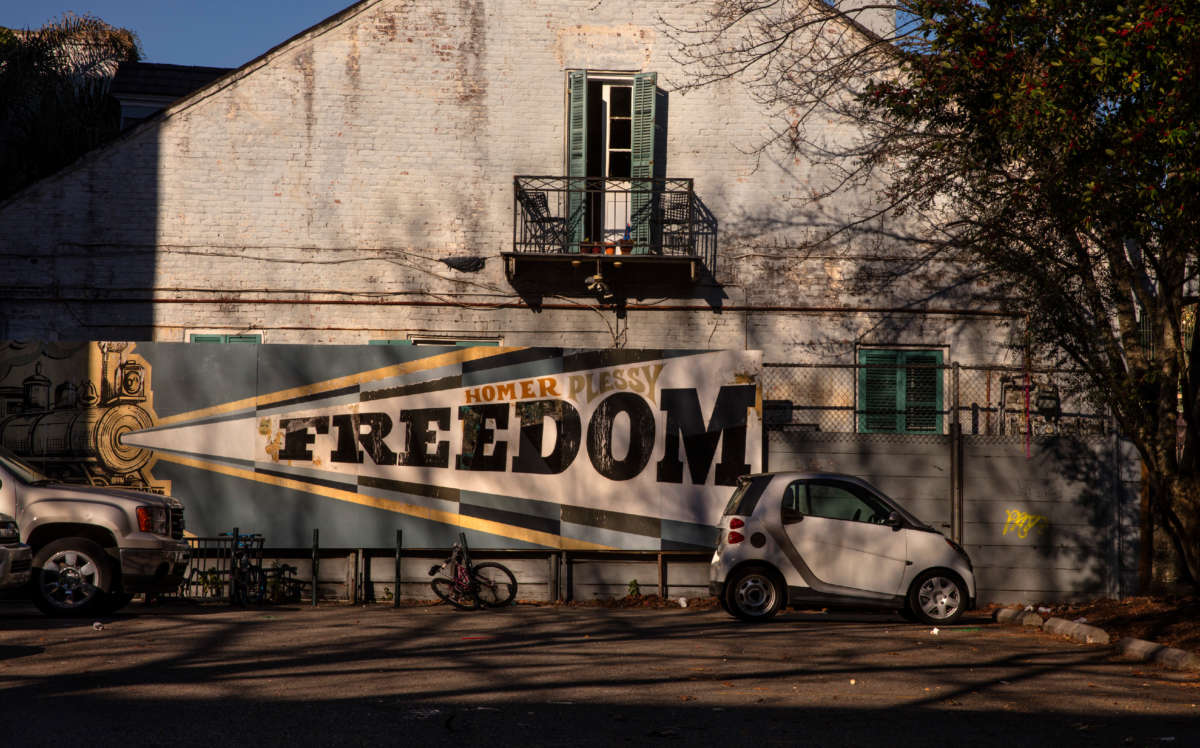Did you know that Truthout is a nonprofit and independently funded by readers like you? If you value what we do, please support our work with a donation.
On Friday, the Louisiana Board of Pardons voted to clear the record of Homer Plessy, a Black man who defied a segregationist state law in the 1890s that resulted in the “separate but equal” Supreme Court ruling.
In June 1892, Plessy, who was a member of a Louisiana civil rights group called the Citizens’ Committee, sat in a whites-only train car during a trip from New Orleans to Covington, Louisiana. Despite purchasing a first-class ticket, Plessy was told to remove himself from the car. When he refused, he was dragged from the train, charged with violating the Louisiana Separate Car Act and fined $25.
When Judge John Howard Ferguson ruled the segregationist law was constitutional, Plessy appealed his case all the way to the Supreme Court. In the 1896 case Plessy v. Ferguson, the court affirmed the judge’s decision. That ruling established the doctrine of “separate but equal,” which allowed de jure segregation to remain in place up until the 1950s, when it was deemed an errant ruling by the Court in Brown v. Board of Education.
Plessy died in 1925. In spite of the ruling made in Brown seven decades ago, the action he took on the train car in 1892 remains part of his official criminal record.
On Friday, the state’s pardons board voted to clear Plessy’s record, citing a little-known (and never used) law called the Avery C. Alexander Act. Passed in 2006, the law allows for the pardoning of individuals who were convicted of violating past laws that were intended to enforce segregation and discrimination in the state.
“It almost makes you think it was designed for just this moment, for Homer Plessy,” said Jason Williams, the Orleans Parish District Attorney.
The pardons board decision now goes to Democratic Gov. John Bel Edwards’s desk for final approval. A spokesperson for Edwards said the governor “looks forward to receiving and reviewing the recommendation of the board.”
The pardon request came after years of work from the Plessy and Ferguson Foundation, an organization led by Keith Plessy and Phoebe Ferguson, descendants of Homer Plessy and John Ferguson who have sought to undo the ruling both say was unjust and unconstitutional.
Though the impending decision to pardon Plessy is significant, it is also a symbolic gesture, one that must be followed by moves addressing the systemic and persistent racism in the justice system today.
“Not that this symbolic gesture from a conviction 128 years ago isn’t important, but we hope the Louisiana Board of Pardons/Committee on Parole is as interested in helping people who are incarcerated in 2021 for the same reasons as Mr. Plessy — unfair prosecutions and unfair laws,” read a tweet from Baton Rouge-based Trichell Law Firm, which dedicates a quarter of its work toward pro bono civil rights cases.
In an article for Truthout in October, religious scholar Adam Kotsko noted that symbolic actions do little to address the material consequences of racism and mostly serve to make white people feel better about themselves.
“The notion of racism as ‘America’s original sin’ underwrites a cycle of performative guilt and ritual repentance among white liberals, as a substitute for any concrete action,” Kotsko said.
The action to undo Plessy’s conviction also comes as dozens of state legislatures across the country — including in Louisiana — are considering (or have already passed) bills intended to ban lessons about racism in K-12 classroom settings. In some of those states, the proposed bills could forbid teachers from discussing the Supreme Court case that bears Plessy’s name.
Press freedom is under attack
As Trump cracks down on political speech, independent media is increasingly necessary.
Truthout produces reporting you won’t see in the mainstream: journalism from the frontlines of global conflict, interviews with grassroots movement leaders, high-quality legal analysis and more.
Our work is possible thanks to reader support. Help Truthout catalyze change and social justice — make a tax-deductible monthly or one-time donation today.
